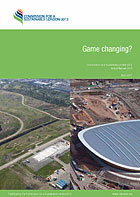The commission published its first review on 29 November 2007. This was the first of its annual governance reviews, looking at the governance arrangements of the delivery bodies for the London 2012 Games and how they are placed to deliver the “most sustainable Games to date”.
Key Findings
- A good start from the delivery bodies on sustainability strategy and planning, but the need to follow up with actions and results
- The need to define an overarching strategy for waste, particularly for legacy but also linked to opportunities to use organic waste from the Games as a fuel and to use energy from organic waste to power the Games
- The need to follow through on a ground breaking attempt to develop a carbon footprint for the games and translate it into strategy for active management and minimisation of carbon and other greenhouse gases
- The requirement to establish cross cutting work streams across the activities of all the stakeholders
- The need for the development of a clear plan for considering ethical issues in procurement and sponsorship contracts for the ODA and LOCOG and to maximise the opportunity presented to encourage wider performance improvements through partners
- The need for ODA and LOCOG to develop a clear statement of intent with respect to standards for temporary venues and temporary overlay
To read the response from the Key Stakeholders to the 2007 Governance Review, please download this letter.
Most significant recommendations
The review made 20 main recommendations and 62 supporting recommendations. The 20 main recommendations are:
- The commission’s 2008 governance review should have a particular focus on the arrangements to stage the Games and deliver a sustainable legacy nationally
- The commission should conduct a formal review of the two Legacy Action Plans as part of its ongoing programme of work. GLA and DCMS should ensure that adequate organisational capacity is aligned to the Legacy Action Plans and associated delivery plans
- OBSG, through the London 2012 Sustainability Group, should establish cross-cutting workstreams to deliver the strategic aspirations described by the five key themes and other significant SD issues. Work programmes, targets and progress should be reported through the London 2012 website and other media, to reflect all stages of the programme
- ODA and LOCOG should develop a clear statement of intent with respect to standards for temporary venues and temporary overlay
- Succession plans are put in place for all key positions essential to the delivery of SD outcomes
- Clear and specific SD objectives and targets should be embedded in ODA sub-project plans, with associated personal objectives, recruitment and training to ensure appropriately skilled personnel. This should have sufficient clarity to support the ODA plans to implement an ISO 14001 based management system
- The full requirements of the London 2012 Sustainability Plan (SP) as they apply to LOCOG should be fully embedded in the next round of functional area business plans. This should be supported by associated personal objectives for functional heads and their teams, with appropriate recruitment and training. This should have sufficient clarity to support LOCOG plans to implement its SD management system
- ODA and LOCOG should clearly set out their proposals for developing management systems (SMS) to cover all aspects of SD which will be subject to further review in the commission’s 2008 governance review
- London 2012 Sustainability Group to develop appropriate SD reporting processes to cover all aspects of the London 2012 programme
- The commission should establish a work programme with the London 2012 Sustainability Group to define how the commission will receive and act on SD performance reports. This work to commence immediately following the publication of this report
- LOCOG should establish dialogue with the utility sponsor (appointed by LOCOG) and the utility partner (appointed by the ODA) in 2008 to understand how the 20% Games time renewable energy target will be achieved. In this regard, LOCOG should consider the opportunity to link with the waste agenda, such as the use of biofuel from anaerobic digestion facilities
- OBSG should consider the options for carbon management associated with the Games based on the current study. This should be followed by clear communication of the resultant strategy. This should be done before the close of the Beijing Games in order for London to have a clear strategy during its tenure as host city
- The LDA should lead the development of a clear vision of waste disposal infrastructure for East London. This should link to opportunities to use waste from the Games as a fuel and to maximise appropriate opportunities to use energy from waste to power the Games and legacy facilities. Local employment opportunities should also be considered as part of this strategy
- The commission should review, in 2008, the processes, infrastructure and resources to maximise the social and economic sustainability opportunities presented by the Games
- The commission should review, in 2009, the arrangements to deliver healthy and diverse sustainable food with linkages to opportunities to improve health and social/economic sustainability
- The commission should conduct a further review of legacy arrangements and plans as part of its ongoing work plan in 2009 and should carry out formal reviews of all relevant strategy documents during the drafting process
- ODA and LOCOG should develop a clear plan to collect information about labour standards in the supply chains of commercial partners and suppliers and, more importantly, make it clear how this information will be used to make procurement and contract management decisions
- The contribution made by sustainability partners should be clearly communicated through various media, including a section of the London 2012 website which also reports their progress against these commitments
- The commission should undertake a further review of commercial arrangements as part of its ongoing work plan
- The commission should undertake a review based on the ODA internal audit report into design to ensure that SD issues have been dealt with appropriately
Download
Back to publications
